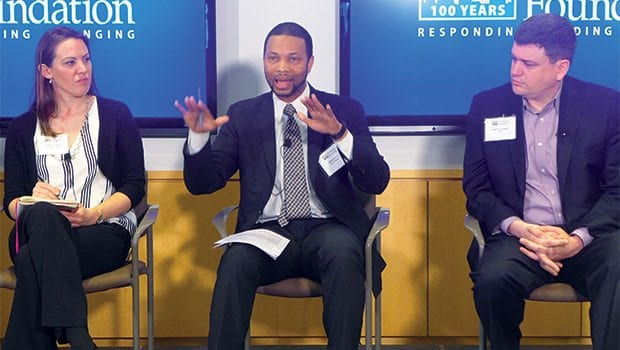
School Superintendent Tommy Chang gave a keynote address at The Boston Foundation last week reflecting on the aspirational goals noted in his 100-Day Plan. Discussion focused on targeting educational inequity, evident at early ages and which, if not tackled, only increases as time goes on.
Joining Chang was a panel of education notables including Rahn Dorsey, Boston’s chief of education; Audrey Jackson, 2016 Massachusetts Teacher of the Year; John Connolly, executive director of nonprofit 1647 and former city council Committee on Education chair; Liliana Mickle, special assistant to the vice provost of Academic Support Services and Undergraduate Studies at University of Massachusetts Boston; and Beliza Moriarty, parent of four children enrolled in BPS schools or playgroups, representing the parent voice.
The 100-Day Plan initiatives were in part inspired by an information gathering series that included approximately 40 listen-and-learn events, Chang said, and will serve as a starting point for the district’s three-year strategic plan.
Among the key initiatives Chang advocates is expanded access to rigorous coursework in fourth grade. Currently, some — but not all — schools offer Advanced Work Classes in grades 4-6, and children have to perform well on a test in third grade to get in.
Access to better educational preparation can mean a better shot at getting into an exam school, and a better shot at getting into college, some panelists said. Liliana Mickle, who was director of UMass Boston’s Office of Undergraduate Admissions for 13 years, said lack of access to rigorous coursework can leave some students unprepared for the college or university majors they desire.
“As a higher education institution, we really need to think about preparation happening the classroom, because it impacts the opportunities students have way beyond the district,” Mickle said. “At the higher education level, it prevents some students from programs they have aspired to be in for years.”

School Superintendent Tommy Chang.
The other side of the hall
Only 10 percent of fourth through sixth graders are enrolled in Advanced Work Classes, while the rest have a more general education, according to Chang. And the difference is stark, both in curriculum and who is represented.
“You walk into one fourth grade class and there’s a certain type of curriculum, a certain type of demographic of student,” Chang said, “And you walk across the hall to another classroom and it looks very different. And it’s cut very along racial and socioeconomic lines.”
The majority of students in AWC are white and Asian males, according to research Chang presented. Under-represented are black, Hispanic, special education and ELL students. Thirty-seven percent of BPS’s students are black, but comprise only 22 percent of students in AWC. Meanwhile, whites are 13 percent of BPS enrollment and 27 percent of AWC enrollment.
In terms of the course quality: “It’s orange juice for some, orange drink for others,” Chang said.
Outside the classroom
Outside the classroom, socioeconomic divides and opportunity gaps can influence a student’s chance at being admitted into the advanced work course program.
A student’s access to AWC depends both on access to a school that offers it and on performing well enough on a one-time standardized test, administered during the first month of school. And the test, said Audrey Jackson, grade 5 teacher at the Joseph P. Manning Elementary School, can shape your whole educational future.
“That’s a humongous pressure to put on little shoulders,” she said.
The testing-in system may exacerbate existing gaps in access to resources, Jackson said. She noted that those students who perform well on a test at the start of the school year are likely to be those who “had enriching summers, excellent programming across the city, had assistances with transportation or resources — so even if their parent can’t drive them to a class, people they know can.”
Once students are divided among AWC and not, students may stay divided. Chang said that during listening sessions, he was told that fourth graders often feel segregated from their peers once put into AWC, but later on, AWC students felt part of a close-knit community.
Expectations aware
Another troubling effect is that children often are aware that their placement reflects assessments of their potential, some said.
When one of Jackson’s non-advance work course students went on to Boston Latin School, she told Jackson that she knew it was unexpected for her, as a non-AWC student, to have that achievement and opportunity.
“[She noted] how she has felt she’s going against the grain, going from a non-advanced work class and working her way up persistently until she got access to that school,” Jackson said.
Budgeting for the future
Systemic biases are evident from early care through post-secondary, Rahn Dorsey said. Addressing this involves steps such as expanded access to high-quality prekindergarten seats and encouraging outside of classroom education opportunities as well, he said.
Here, too, the budget question looms. The latest plan for Boston Public School’s budgets spare high schools much of the funding reductions by, in part, instead taking $6 million from planned initiatives, including introducing an “Excellence for All Pilot” that would expand rigorous coursework to more fourth grade students this fall, with intention of bringing such coursework to all BPS fourth through sixth graders over the next few years.
Another initiative would put $4 million toward increasing the offering of K1 seats. Under current budgets, the “Excellence for All Pilot” will be put on hold and the preschool expansion initiative will be reduced by $1 million.
Chang told reporters that he is optimistic that more funding will come from the state and/or federal government, thus allowing rigor expansion programs to be initiated this fall.


![Banner [Virtual] Art Gallery](https://baystatebanner.com/wp-content/uploads/2024/04/Cagen-Luse_Men-at-store-e1713991226112-150x150.jpg)



